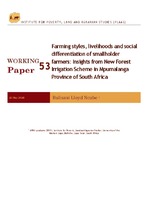| dc.contributor.author | Ncube, Bulisani Lloyd | |
| dc.date.accessioned | 2019-03-18T10:02:30Z | |
| dc.date.available | 2019-03-18T10:02:30Z | |
| dc.date.issued | 2018-05 | |
| dc.identifier.citation | Ncube B (2018) 'Farming styles, livelihoods and social differentiation of smallholder farmers: Insights from New Forest Irrigation Scheme in Mpumalanga Province of South Africa’, Working Paper 53. PLAAS, UWC: Cape Town. | en_US |
| dc.identifier.uri | http://hdl.handle.net/10566/4536 | |
| dc.description.abstract | This article focuses on the socio-economic differentiation of smallholder farmers in New Forest Irrigation Scheme. Smallholder irrigation schemes are seen as a way of alleviating poverty and contributing to economic growth. Although smallholders are lumped together as a homogenous group, the study of New Forest Irrigation Scheme shows diversity amongst farmers’ endowments, farming styles and livelihood trajectories. Understanding the social differentiation of smallholder farmers is essential in ensuring that they are assisted in pursuing farming styles that are congruent to their respective livelihood trajectories. The article argues that farming objectives and livelihood aspirations are not only varied according to individual circumstances but also evolve over time. | en_US |
| dc.language.iso | en | en_US |
| dc.publisher | Institute for Poverty, Land and Agrarian Studies, University of the Western Cape | en_US |
| dc.relation.ispartofseries | Working Paper;53 | |
| dc.subject | Smallholder irrigation | en_US |
| dc.subject | Livelihoods | en_US |
| dc.subject | Farming styles | en_US |
| dc.subject | Gross margins | en_US |
| dc.subject | Socio-economic differentiation | en_US |
| dc.title | Farming styles, livelihoods and social differentiation of smallholder farmers: Insights from New Forest Irrigation Scheme in Mpumalanga Province of South Africa | en_US |
| dc.type | Working Paper | en_US |

